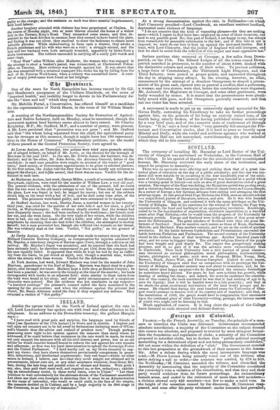lEtt il3robintes.
One of the seats for North Hampshire has become vacant by Sir Gil- bert Heathcote's acceptance of the Chiltern Hundreds, on the score of "impaired health," and inability longer to devote to his Parliamentary du- ties the " time and toil " which they demand.
Mr. Melville Portal, a Conservative, has offered himself as a candidate for the representation of North Hants, in the room of Sir William Heath- cote.
A meeting of the Northamptonshire Society for Protection of Agricul- ture and Native Industry, held on Monday, must be mentioned, though the movement against land burdens seems almost to have ceased. Sir Charles Enightley, M.P., Mr. Stafford, M.P., and a number of gentry, were present. A Mr. Love persisted that "protection was not gone "; and Mr. Stafford said that "the wheat being separated from the chaff, the agricultural party was far stronger at this moment, though it might have but 190 representa- tives in the House of Commons." Parliamentary petitions, on the model of those passed at the Central Protection Society, were agreed to.
At Lewes Assizes, on Thursday, two actions were tried upon grounds arising out of alleged bribery, on behalf of Mr. Jervis. at the election for the borough of Horsham in the year 1847. In the one, Mr. Edwin James, the barrister, was de- fendant; and in the other, Sir John Jervis, the Attorney-General, father of the candidate: in each ease penalties were sought on account of the tender of " good tarns," hard money, or Government appointments to be given to solicited electors. In the first action, the Judge told the Jury that there was hardly any evidence to support the charge; and in:the second, that there was no case. Verdict for the de- fendant in each case.
At Maidstone Assizes, last week, George Millen, a youth of seventeen, and Henry Sheepwash, eighteen, were tried for the murder of William Law, a very old mar. The general evidence, with the admissions of one of the accused, left no doubt that the two went to the old man's cottage to rob him. When they had entered the place, Law was found in bed; he begged for mercy; but one of the robbers struck him on the head with a bar of iron, and he died some time after, of the wound. The prisoners were found guilty, and were sentenced to be hanged.
At Stafford Assizes, last week, Martha Jones, a married woman in her twenty- third year, was tried.for the murder of her own infant and her niece, a girl of twelve, at Wolverhampton. The evidence clearly showed that the woman had been frequently insane; she had been confined iu the workhouse ; her friends took her out, and she went home. On the very night of her return, while the children were in bed, she cut their heads off with a knife; and after she had roused the neighbours by shouting that she had killed the children, she attempted to destroy -herself; but a man prevented her, though she inflicted two wounds on her throat. She was evidently mad at the time. Verdict, " Nut guilty," on the ground of insanity.
At Derby Assizes, on Monday, an attempt was made to extract money from the Midland Counties Railway Company, as compensation for injuries sustained by Mr. Haydon, a veterinary surgeon of Barton-upon-Trent, through a collision on the railway. Mr. Haydon's finger was scratched, and he asserted that his back had been seriously hurt; he therefore endeavoured to get 1591. from the company; but his ease signally failed. It appeared that while he kept his bed by day as suffer- ing from the hurts, he got drunk at night, and, though a married man, walked about the streets with loose women. Verdict for the defendants.
At York Assizes, last week, Edward Mathers was tried for the murder of John Harrison, gamekeeper to the Earl of Ripon. Harrison was found dead in a plan- tation, shot through the heart. Mathers kept a little shop at Hutton Conyers ; he Lad been a poacher; he was seen in the vicinity at the time of the murder ; his boots corresponded with marks in an adjacent field; shots similar to those taken from the body were found at his shop; and other petty circumstances of a suspicious character were noticed. But the evidence was not conclusive in any respect— "a hundred nothings" the prisoner's counsel called the facts mentioned in the opening for the prosecution; and when the evidence against the prisoner had closed, Mr. Baron Alderson asked the Jury if they required any defence. They returned a verdict of "Not guilty."


























 Previous page
Previous page